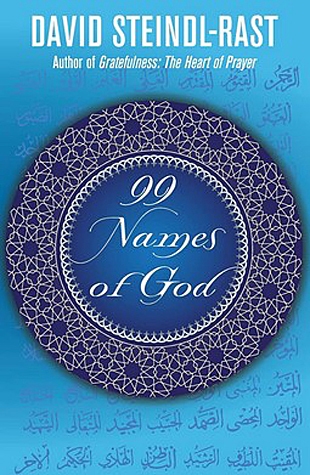David Steindl-Rast is one of our Living Spiritual Teachers. In fact, he is probably the elder of this venerable group among those still actively teaching. Like Thich Nhat Hanh, Brother David was born in 1926.
A quick search will reveal that we have reviewed at least two other books over the years with this same or very similar title, because reciting and honoring the Ninety-Nine Names for God is an important spiritual practice of Islamic spirituality. Muslims find ninety-nine names for Allah in the holy Qur’an. Here, Brother David offers his interpretations of these names, usually beginning with a general understanding or misunderstanding, then sometimes weaving Muslim teachings together with his own wisdom which is usually mystically Christian but often more universal.
For example, #5, “as-Salaam,” is “The Peace, the Giver of Peace,” about which Brother David says: “Peace is … the dynamic stillness of a calmly burning candle flame and is rooted in an all-encompassing order.” And #7, “al-Muhaymin,” or “The Guardian and Keeper” is described as an aspect of God that safeguards us from feelings of desperation.
Sometimes, Brother David revalues older metaphors for God, giving them fresh understandings for twenty-first century people, such as this for #65, “al-Maajid,” “The Resplendent, the Magnificent”:
“On the surface, a number of divine names sound to us like honorary titles that potentates like to give themselves. One of those is the Resplendent. But we must probe this more deeply. The names of God express insights familiar to us from our inner experience, or those we have gained from encounters with creation. We call the Resplendent by this name because nature in its beauty seems to us gloriously resplendent. In a sense, beauty might be the more obvious term — but it is radiant beauty we mean when we say ‘resplendent,’ and we should always be conscious of that aspect when we speak of God as the Resplendent.”
See the excerpt accompanying this review for another extended example of this sort of revaluing, on the theme of “The Raiser of the Dead.”
Each name for God is concluded with a few sentences of spiritual practice such as this one for #9, “al-Jabbar” “The Powerful”: “Today, take the time to look long and quietly at something alive — perhaps a sleeping child, a tree, your own hand. As you do, silently speak the words, ‘the Powerful’ and contemplate what you imagine behind them.”
